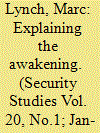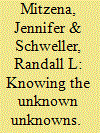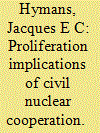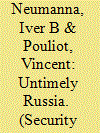|
|
|
Sort Order |
|
|
|
Items / Page
|
|
|
|
|
|
|
| Srl | Item |
| 1 |
ID:
104076


|
|
|
|
|
| Publication |
2011.
|
| Summary/Abstract |
This article explores the reasons for the dramatic change in Sunni Arab Iraqi attitudes toward the United States from 2004 to 2007, which made possible the "Awakenings," local groups of mostly Sunni tribes and former insurgents that decided to cooperate with the United States against al Qaeda in Iraq. While there have been many studies of the military strategy, there has been little attention paid to the reasons for the underlying attitude change. This article argues that the dramatic changes in the information environment and in the nature of direct contacts across a range of Sunni society played a crucial role. It draws on a wide range of Arabic language primary sources that have generally been neglected in U.S. military-centric accounts. No single dialogue flipped the Sunnis, and the change would not likely have happened without the material changes underpinning their interests. But years of ongoing, intensive dialogues across a wide range of interlocutors reshaped the foundations of the relationship and to convince those involved individuals of the possibility of a strategic shift. American counterinsurgency (COIN) doctrine and the surge helped by proliferating the points of contact with Iraqis and by transforming the relations at the individual level. This has broad implications for key debates in contemporary U.S. foreign policy, as well as for counterinsurgency and international relations (IR) theory.
|
|
|
|
|
|
|
|
|
|
|
|
|
|
|
|
| 2 |
ID:
104074


|
|
|
|
|
| Publication |
2011.
|
| Summary/Abstract |
International Relations (IR) theory grants a privileged place to uncertainty. In practice, however, the problem does not seem to be uncertainty but certainty: if only the decision makers would acknowledge uncertainty, conflict might somehow be avoided. We challenge the "uncertainty bias" of IR scholarship by developing misplaced certainty as a distinct and common pathway to war. By misplaced certainty we mean cases where decision makers are confident that they know each other's capabilities, intentions, or both; but their confidence is unwarranted yet persists even in the face of disconfirming evidence. We argue that misplaced certainty drives two familiar conflict pathways thought to depend on uncertainty: security dilemmas and spirals. We then conceptualize misplaced certainty, highlighting its affective dimension. Building on the work of post-Keynesian economists and economic sociologists we articulate the dynamics of certainty production and how it can go awry. Our "confidence model" of certainty can account for both the phenomenology and frequency of misplaced certainty, particularly in conflict situations, while providing social theoretical underpinnings to the Classical Realist admonition of prudence.
|
|
|
|
|
|
|
|
|
|
|
|
|
|
|
|
| 3 |
ID:
104078


|
|
|
|
|
| Publication |
2011.
|
| Summary/Abstract |
Programs of international civil nuclear cooperation-of "Atoms for Peace"-have come under growing criticism for unintentionally fostering nuclear weapons proliferation in developing countries. However, drawing on the literature on international technology transfer and on Albert Hirschman's theory of exit, voice, and loyalty, this article argues that Atoms for Peace efforts may often seriously hamper developing countries' nuclear weapons ambitions by empowering their scientific workers and by facilitating the brain drain to the developed world. The article then presents a case study of the historical nuclear program of Yugoslavia, which received very generous help from the Atoms for Peace programs of the United States, Soviet Union, and European states at a time when nonproliferation controls were minimal. The international ties of the Yugoslav nuclear program made its scientific workers much less likely to choose simple loyalty to the Tito regime, and much more likely to choose voice or exit, accelerating the program's ultimate collapse.
|
|
|
|
|
|
|
|
|
|
|
|
|
|
|
|
| 4 |
ID:
104081


|
|
|
|
|
| Publication |
2011.
|
| Summary/Abstract |
This article draws on Pierre Bourdieu's sociology to explain how a lack of fit between a repertoire of bodily practices accumulated through history, on the one hand, (here, Russian habitus) and the field in which it is employed, on the other, (here, diplomacy) can take shape in world politics. Such "hysteresis" provides a longue durée reading that challenges both the realist idea that similar outcomes are due to invariant structures and the constructivist idea that structures "socialize" states. Social stability stems from agency, more specifically, from habitus. Our empirical examples are breaking points in Russian relations with neighbors: the Rus' and the Eurasian steppe empires (ca. 800-1500), Muscovy's diplomatic interactions with Europe, and Russia's bid to join European international society and situation during the twentieth century. In each case, Moscow's relentless quest for equal status prompted quixotic practices that were often dismissed by Western countries and hampered the security of both parties.
|
|
|
|
|
|
|
|
|
|
|
|
|
|
|
|
|
|
|
|
|